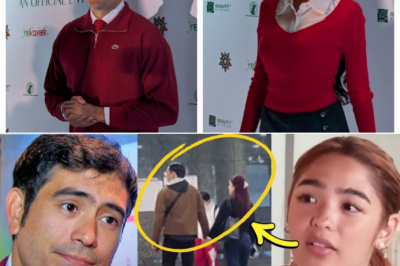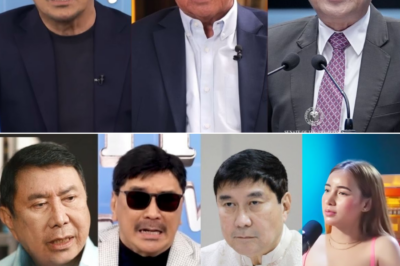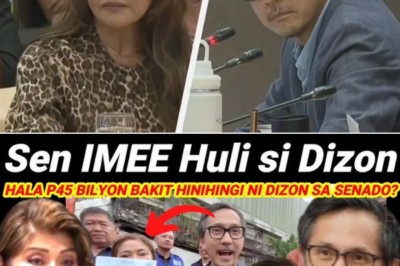1. A Cold Night, a Silent Vow
In the forgotten shadows of the city, ten-year-old Francisco huddled beneath a crumbling overpass, listening to the raspy breathing of his six-year-old sister, Clara. The cold clawed at their thin blankets, and her fevered cough grew worse with each breath. Their mother, Marta—blind for years after an untreated illness—could only grasp their hands in the dark, hoping it might protect them from what the world had already stolen. That night, Francisco made a promise to his sister: he would bring back food, and somehow, the medicine she needed. It was a promise made not with confidence, but with desperation.

2. From the Streets to the Sidewalk of Luxury
Dragging a battered cart through alleys and avenues, Francisco spent the day collecting scraps, hoping to turn cans into coins. But luck had abandoned him. Rejected by gatekeepers of wealth and bullied by older kids on the street, he ended the day with just enough for a stale piece of bread. Then, while wandering the upscale neighborhood of Jardins, he stopped in front of LeCiel, an elite restaurant that shimmered like a different world behind its glass walls. The warmth, the laughter, the scent of meat and wine—it was everything he had promised Clara, but couldn’t yet give.
3. “You Want Food? Then Entertain Us.”
Summoning all his courage, Francisco entered LeCiel. He wasn’t looking for handouts—just leftovers. But the maître d’ moved to block him, ready to toss him out. That’s when Rodrigo, a rich, bored young man in designer clothes, interrupted. With the smooth cruelty of someone used to power, he invited Francisco over—like calling a stray dog—and demanded a performance. “Sing for your dinner,” Rodrigo said, turning the boy into a spectacle for the amusement of his wealthy friends. The room, once full of clinking glasses and polite chatter, grew quiet. The humiliation was carefully staged.
4. A Song That Silenced the Room
Francisco could’ve walked away. He could’ve screamed or cried. But instead, he closed his eyes and did the only thing that had ever brought comfort to his mother and sister—he sang. The melody was simple, a folk lullaby his father had once taught him, about a bird who had lost its nest in a storm. But the voice that came out of him was not that of a child begging for food. It was pure, haunting, and filled with a sorrow so raw that the entire restaurant froze. The performance lasted minutes—but left an eternal mark.
5. From Mockery to Applause
When the last note faded, silence hung thick in the air. The smirk had vanished from Rodrigo’s face. Even his wealthy friends sat still, stunned. And then came a slow, deliberate applause. It echoed from the corner of the room, where an older man with silver hair and wet eyes had stood to clap. His name was Senhor Valença, a reclusive millionaire and patron of the arts. He wasn’t clapping for pity—he was clapping for genius. Soon, the entire restaurant followed in a standing ovation. Francisco, the boy mocked as a “rat,” had stolen their hearts.
6. A Lifelong Debt—and a Dangerous Enemy
Senhor Valença approached Francisco with humility and admiration. He didn’t offer charity—he offered respect. Declaring that Francisco and his family would eat at LeCiel for free, under his account, he embarrassed Rodrigo publicly. Rodrigo’s friends were no longer laughing. Humiliated and furious, he watched as the boy he tried to degrade was lifted up instead. But Rodrigo wasn’t done. That night, he made a call to someone in the shadows. “Find out everything about that boy,” he ordered. “I want to destroy him.” The battle lines had been drawn.
7. From Ruins to Refuge
True to his word, Valença took Francisco home—to his real home: a leaking, mold-ridden shack behind an abandoned tire shop. There, he met Marta, the blind mother who’d raised her children with dignity, and Clara, the sick girl whose shallow breaths betrayed her condition. Valença didn’t flinch. He arranged immediate medical care, emergency antibiotics, and moved the family into a small, clean apartment that very night. For the first time in years, Francisco and Clara slept in real beds, under warm blankets, with full stomachs. It was a miracle—but miracles often come with a cost.
8. Rodrigo Strikes Back
While Francisco strummed a gifted guitar and Clara’s fever began to break, their doorbell rang. Two officials from the child welfare office stood at the threshold, holding a clipboard and wearing grim expressions. An anonymous complaint had been filed—alleging that Marta, due to her blindness, was unfit to care for her children, and that Francisco was being manipulated by a powerful stranger. It was a calculated strike. Rodrigo had used the law not to protect, but to punish. And now, the very system that had ignored their suffering threatened to tear them apart.
9. Voices Louder Than Accusation
In the face of bureaucratic coldness, it was Marta who stood tall. “I may be blind,” she told the officials, “but I see my children with my hands, my ears, and my heart.” Valença supported her with documents, medical records, and receipts showing how much had already been done for the children’s well-being. The officials left—but not without warning. A court case would be opened. Regular inspections would follow. And Valença was advised to legally adopt or become guardian to the children, if he wanted to protect them long-term. The battle for their future had only begun.
10. A Voice, a Weapon, a Future
Valença understood what needed to be done. He enlisted elite lawyers to handle the custody case and hired investigators to uncover Rodrigo’s secrets. But most importantly, he brought Francisco to Maestro Antunes—a reclusive music teacher known for training prodigies. At first skeptical, the maestro made Francisco sing. Within seconds, his crusty demeanor melted. “You’re not a street kid,” he told Francisco. “You’re a born artist.” Under the maestro’s guidance, Francisco began formal vocal training. His voice, once used to beg for food, was now being sculpted into something powerful—a weapon, a gift, a legacy.
Final Thoughts: The Fight Isn’t Over—But the Boy Has Found His Song
This is not a fairy tale. Rodrigo hasn’t vanished. The court case still looms. And poverty, even when pushed away, often tries to crawl back in. But something has changed. Francisco, once invisible to society, now has people fighting beside him. More importantly, he has found his voice—not just as a singer, but as a symbol. In a world quick to judge and slow to listen, his story reminds us of what we lose when we silence the poor: not just lives, but beauty, truth, and hope.
News
Claudine Barretto at Milano Sanchez, Hiwalay Na! Lihim na Sigawan sa Tahanan Nagbukas ng Lihim na Tensyon
Simula ng AlitanUsap-usapan ngayon sa social media ang diumano’y paghihiwalay nina Claudine Barretto at Milano Sanchez, kapatid ng broadcast journalist…
Gerald Anderson at Andrea Brillantes, Lihim na Nagde-Date? Andrea Nagsalita, Netizens Nabigla sa Posibleng Relasyon
Sa mundo ng showbiz, ang bawat galaw ng mga kilalang artista ay agad nagiging usap-usapan, lalo na kung may halong…
Tuloy-Tuloy na Bangayan: Ben at Mon Tulfo, Nagkainitan Dahil sa Isyu nina Raffy Tulfo at Chelsea Elor
Sa mundo ng showbiz at politika sa Pilipinas, bihira ang mga pamilya na lantaran ang alitan sa publiko, lalo na…
Isang Halik sa Gitna ng Musika: Daniel Padilla, Lantad ang Lambing kay Kaila Estrada sa Concert na Pinag-usapan ng Lahat
Sa mundo ng showbiz sa Pilipinas, sanay na ang publiko sa mga tsismis, espekulasyon, at mga relasyong madalas ay nababalot…
“Trabaho Lang Po”: PBBM at Sec. Vince Dizon Pinuri sa Bicameral Matapos Igiit ang Reporma at Pagbawas sa Overpricing sa DPWH
Sa gitna ng maiinit na diskusyon at matitinding alegasyon tungkol sa 2026 national budget, isang malinaw na mensahe ang umangat…
Imee Marcos Hinamon si Vince Dizon sa Budget ng DPWH: Dagdag na ₱45B, Paulit-ulit na Paliwanag, at Matinding Sagutan sa Bicameral
Uminit ang talakayan sa loob ng Bicameral Conference Committee (Bicameral) matapos harapang kuwestiyunin ni Senator Imee Marcos ang Department of…
End of content
No more pages to load












